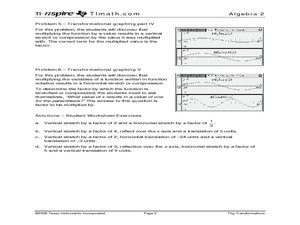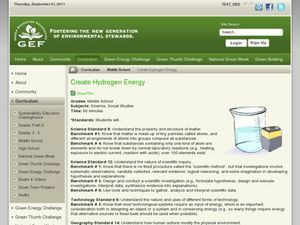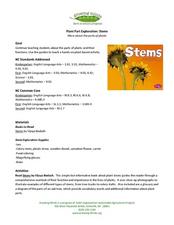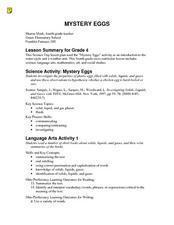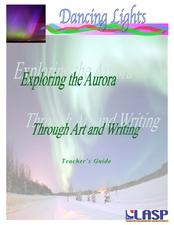Curated OER
Snowflake Bentley
Learners explore crystals through the story Snowflake Bentley and then create crystal pictures of their own. In this interdisciplinary lesson, they create a crystal web chart on chart paper, design artificial snowflakes, and write poems...
Curated OER
Solar Kit Lesson #9 - Properties of Solar Radiation: Reflection, Transmission, and Absorption
Middle school science stars observe and record data on the solar radiation reflected off or transmitted through various materials. They predict properties for various materials, and test their predictions by touch. This lesson becomes...
Baylor College
What Is the Water Cycle?
Small groups place sand and ice in a covered box, place the box in the sunlight, then observe as evaporation, condensation, and precipitation occur. These models serve as miniature water cycles and demonstrations of the three phases of...
Curated OER
Conducting a Functional Behavior Assessment
This is an excellent guideline for an observer to use when conducting an assessment for a student who has a chronic behavior problem. The chart has 3 categories--antecedent, behavior, consequences--and clear examples to guide you.
Curated OER
"Finding Your Sweet Tooth"--An Introduction to the Dichotomous Key
Sixth graders classify candy according to observable characteristics. They use a dichotomous key to identify their bag of "treats." Thus, describe how dichotomous keys help to the identifying of organisms. Design a self-generated...
Curated OER
Dashboard of the Future
Students design dashboards for vehicles in 2020. After researching past and current trends in vehicle design, they sketch alternatives and select one to draw with computer-assisted design software (CAD), labeling all the components. With...
Curated OER
The Circulatory System--Part VI
Students outline a body on butcher paper. Students fill in the circulatory system using materials of various textures. Students decorate all the parts of the circulatory system with art articles, like buttons, yarn, etc.
Curated OER
Tutti Frutti
Get some competition going in your life science class. Give lab groups a variety of plant parts, all of them fruits, except one. Their mission is to make observations, compare and contrast, in order to be the first to identify the...
Curated OER
Trig Transformations
Learners investigate trigonometric function. In this Algebra II instructional activity, high schoolers explore functional notation and transformational graphing of trigonometric functions.
Curated OER
Hawaii's Sandy Shores
Investigate Hawaii's sandy shore ecosystem! Start by creating a vocabulary list and having your class complete a KWL chart. Next, pass out the "I think of" sheet. Each learner will then choose a word from a beach bucket and add it to...
Curated OER
Create Hydrogen Energy
Students complete an experiment to understand changes to the environment over time. In this hydrogen lesson, students discuss electrolysis and conduct an electrolysis experiment. Students observe and record their experiment.
Curated OER
Plant Part Exploration: Stems
Explore water transport in plant stems using this fun experiment! Your scientists will start by reading Stems by Vijaya Bodach. Then, activate prior knowledge about plant stem functions and water transportation. Demonstrate this concept...
Curated OER
Solar Electricity ~ The Colour Sensitivity of a Photovoltaic Cell
Teacher's notes, a materials list, detailed procedure, tips, and extension ideas are all included to make teaching this lesson on photovoltaic cells a sunny spot in your day! After some brief background reading, physical science...
Curated OER
Seeing and Feeling Sound Vibrations
Groups rotate through a series of stations and work with a partner to observe sound waves. Children describe sound in terms of pitch, volume, and frequency. To apply their new knowledge, the class considers how these observations can...
NASA
Radiation Shielding on Spacecraft
Here is a terrific science lesson for your elementary schoolers. In it, learners analyze different materials to simulate space radiation shielding on spacecraft, then select the best material to use to build one. This is a classic...
Curated OER
Mystery Eggs
Students investigate the properties of plastic eggs filled with solids, liquids, and gases and use these observations to hypothesize whether a chicken egg is hard-boiled or raw.
Curated OER
Scaling it Down: Caves Have Maps, Too
Measurement and map skills are the focus of this lesson, where learners crawl through a "cave" made out of boxes, desks and chairs, observing the dimensions. Your young geographers measure various aspects of the cave and practice math...
Curated OER
Dancing Lights
Students view artwork and navigate the Internet, and read books to learn about the Aurora Borealis. In this Northern Lights lesson, students complete a KWL and separate the facts from the myths about the Northern lights. Students answer...
Baylor College
Finding the Carbon in Sugar
In session one, demonstrate for your class how a flame eventually goes out when enclosed in a jar in order to teach that oxygen is required for combustion. In session two, class members then burn sugar in a spoon to observe how it...
Safe Drinking Water Foundation
Demonstration of Water Pollution
In this teacher-led demonstration, your young environmentalists will observe and record how different types of water pollutants look when they are combined. From here, individuals will develop a hypothesis on how the water can be...
Virginia Department of Education
Prokaryotes
Lead your biology class on a cell-sized adventure! Emerging scientists construct models of prokaryotes, then design an experiment to properly grow a bacterial culture. They conclude the activity by viewing the culture under a microscope....
Curated OER
Capturing the Reader With Vivid Images
Students examine the use of imagery to hold a reader's attention in an excerpt from John Deever's memoir "Mr. John and the Day of Knowledge". They are introduced to background information about the Ukraine and create original imagery.
Serendip
Is Yeast Alive?
Through two investigations, life science learners determine whether or not yeast is alive. They perform tests for metabolism by providing sugar and observing if gas is produced as a byproduct. They incubate some of the sample for at...
Center Science Education
Investigating the Climate
What do graphs of atmospheric gases over time show us? Do they indicate that carbon sources and carbon sinks are not in balance? Up-and-coming meteorologists watch video clips, read information, and analyze data from the HIPPO (HIAPER...










